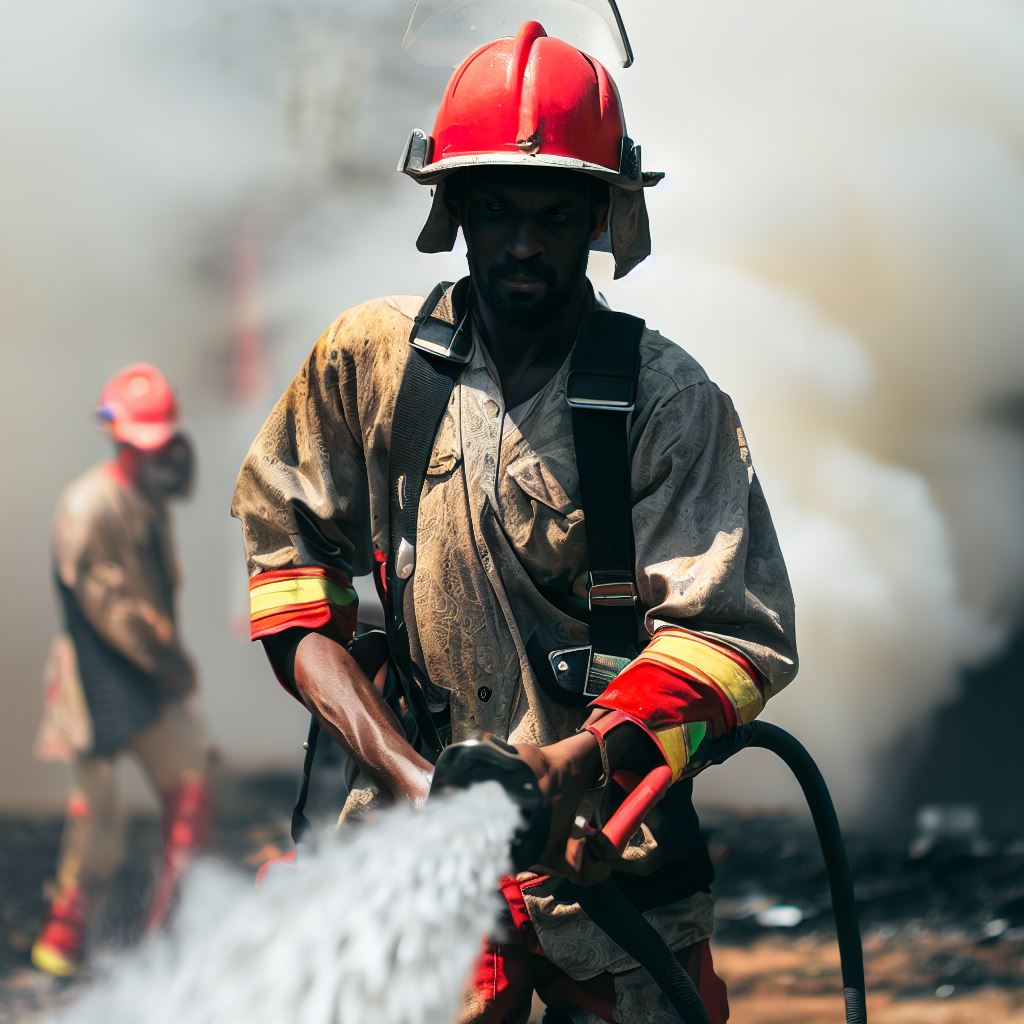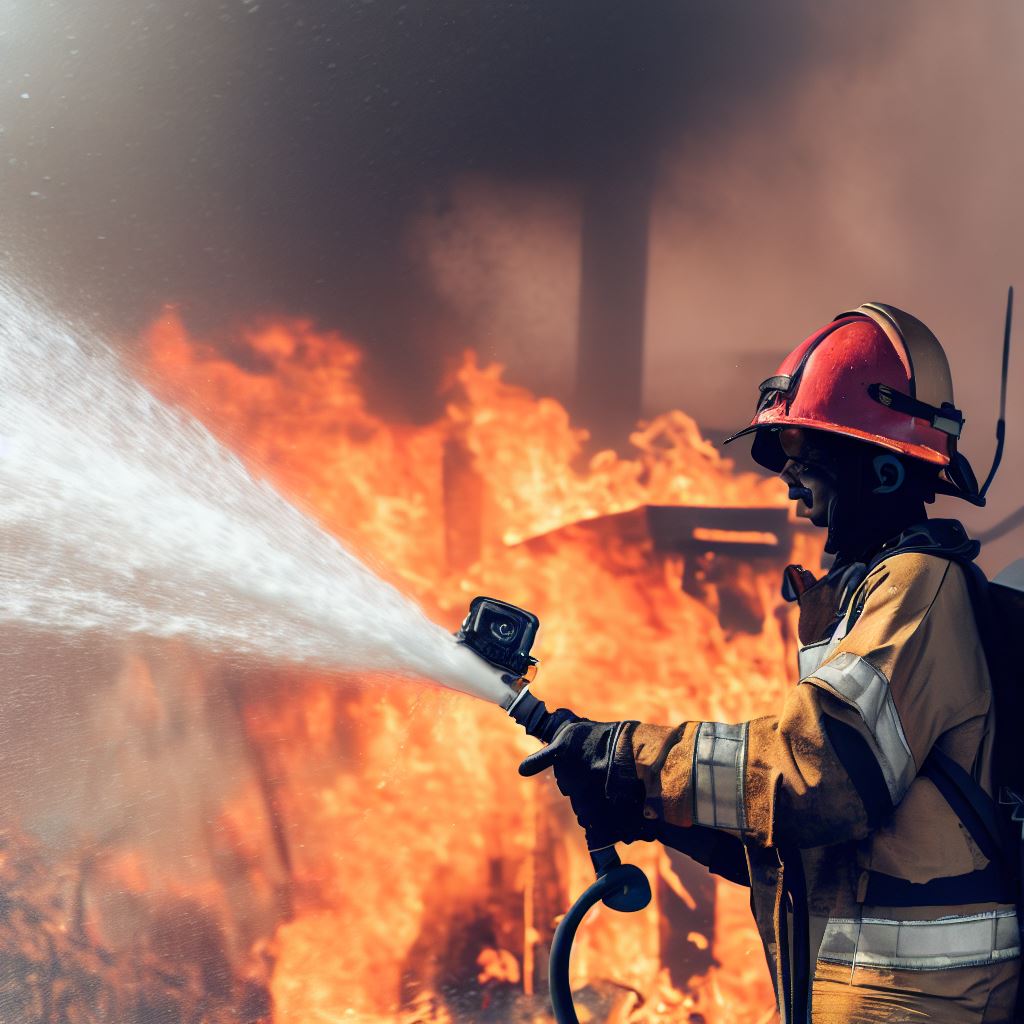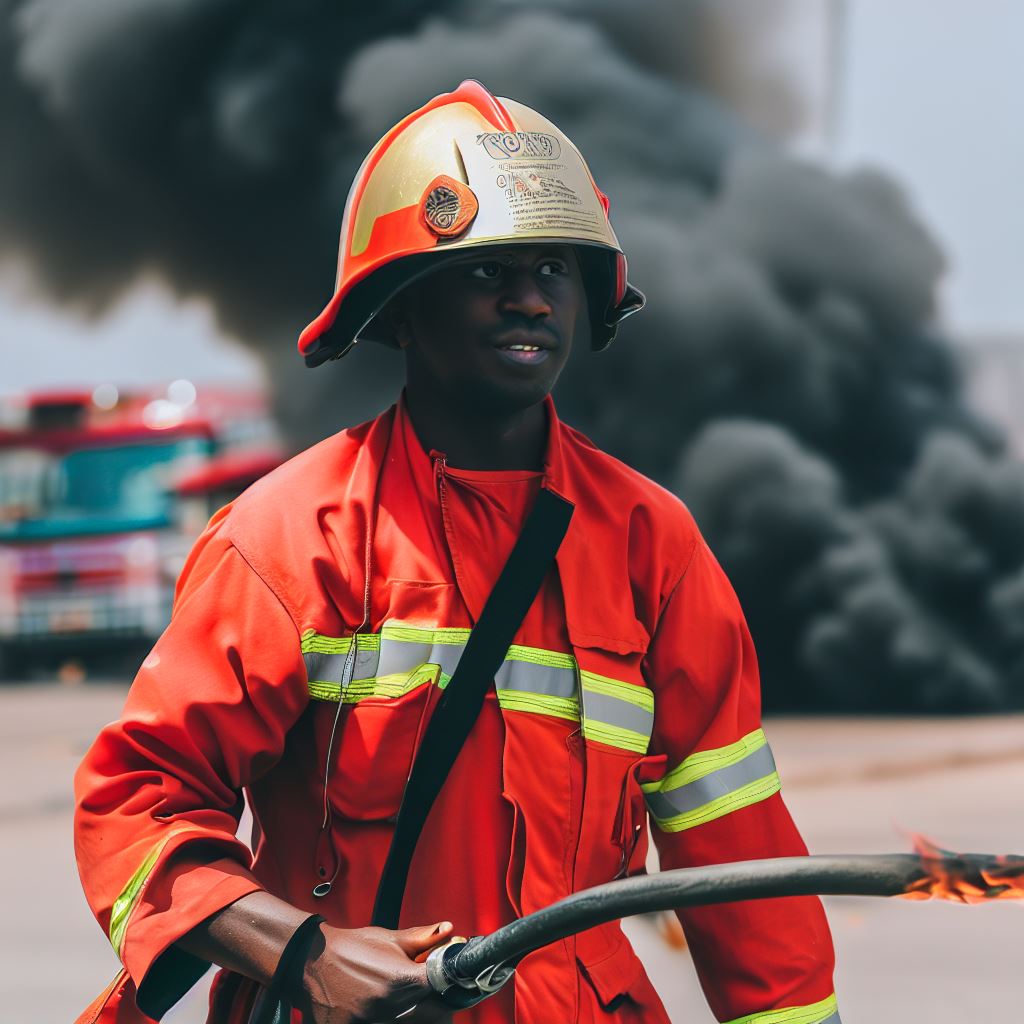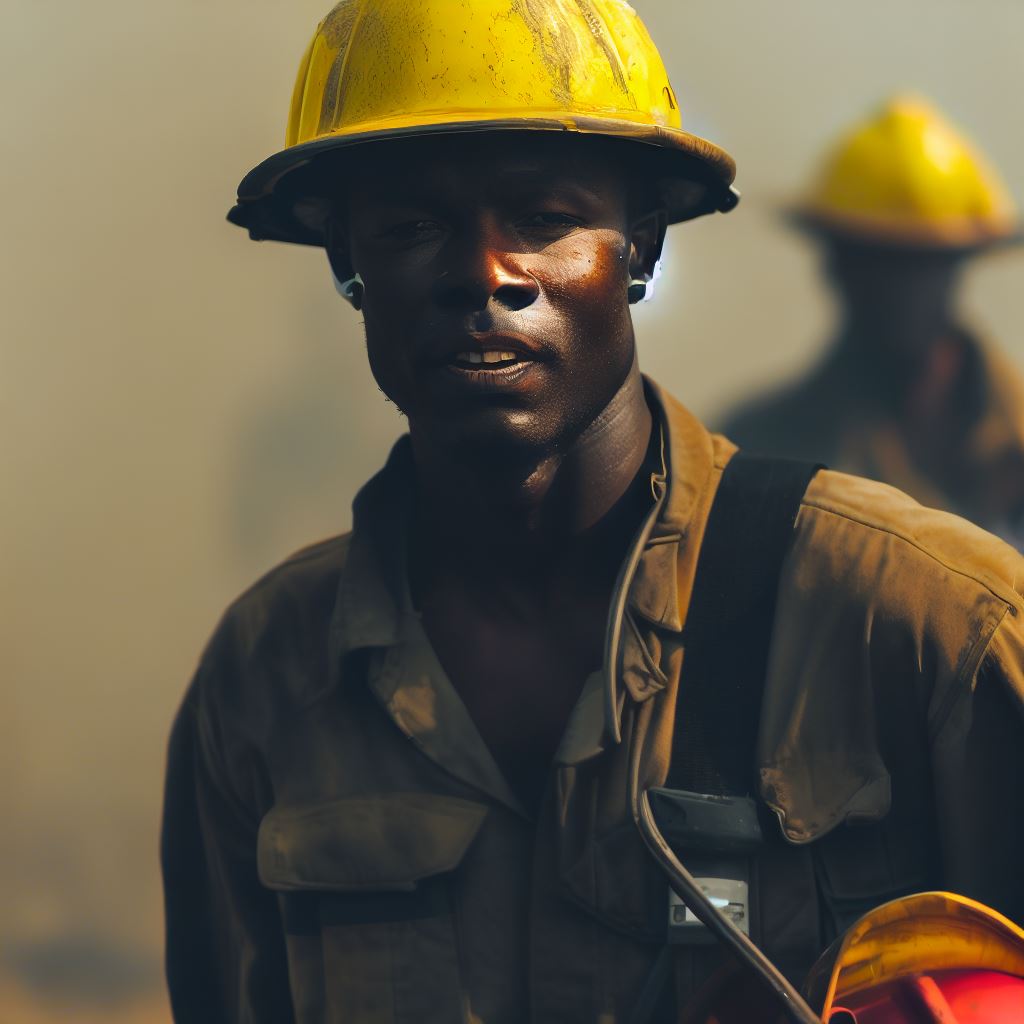Introduction
Nigeria fire fighting situation is defined by numerous challenges and limited resources.
Fire fighters in this country face difficulties in terms of equipment, funding, and infrastructure, which often hamper their ability to respond effectively to emergencies.
Despite these challenges, the role of fire fighters in Nigeria’s community cannot be overstated. They are the unsung heroes who selflessly put their lives on the line to protect people, property, and the environment.
A typical day in the life of a Nigerian fire fighter is demanding and unpredictable. The day starts with physical training and briefing sessions to ensure readiness for any emergency situation.
They are then deployed on various assignments, including responding to fire outbreaks, rescuing people trapped in buildings, and providing emergency medical assistance.
Each day brings a unique set of challenges that require quick thinking, teamwork, and immense courage.
Nigerian fire fighters are not only responsible for extinguishing fires but also for conducting fire safety inspections in public places and educating the community on fire prevention and safety measures.
They work tirelessly round the clock, being on standby for emergencies, ready to respond promptly at a moment’s notice.
In fact, Nigeria’s fire fighting situation embodies the dedication and resilience of its fire fighters.
They are the backbone of the community, tirelessly working to protect lives and property, despite the challenges they face.
It is essential to recognize and appreciate their selfless efforts in keeping the community safe from the devastating effects of fire accidents.
The Beginning of the Shift
As the sun rises over the bustling city of Lagos, Nigeria, a group of heroes prepares to face another day filled with danger and uncertainty.
They are the brave firefighters of Nigeria, dedicated to ensuring the safety and well-being of their fellow citizens.
A. Early Morning Preparations
Before the chaos and unpredictability of the day take over, the firefighters start their shift with a series of early morning preparations.
Their first task is to meticulously check and inspect all the firefighting equipment and vehicles at their disposal.
From fire hoses and extinguishers to specialized rescue tools, every item must be in perfect working condition, ready to save lives and battle the flames.
Gathering the necessary resources is the next crucial step. The firefighters meticulously organize their gear, making sure they have everything needed to face any emergency.
They put on their protective suits, ensuring a proper fit to shield themselves from the intense heat and toxic fumes.
They check their masks, ensuring they are sealed tightly to prevent smoke inhalation.
Lastly, they equip themselves with the right tools – axes, ladders, and powerful water pumps – essential for rescuing trapped individuals and extinguishing fires.
B. Briefing and Assignments
As the preparations wrap up, the firefighters gather for the morning briefing, a vital part of their routine.
During the briefing, they discuss previous incidents and ongoing emergencies, sharing valuable insights and experiences.
This allows the team to learn from past situations, identify potential challenges, and refine their emergency response strategies.
The most experienced firefighter, often the team leader, takes charge during the briefing session.
They delegate duties and assign specific areas of responsibility to each firefighter based on their skills and expertise.
Some may be responsible for driving the fire truck and ensuring quick and safe arrival at the scene, while others may specialize in search and rescue operations or operating the water pumps.
After the briefing, the firefighters are aware of their roles and responsibilities. They are prepared mentally and physically to confront any emergency that may arise during their shift.
They stand united, driven by a shared purpose to protect lives, property, and the well-being of their community.
And with the sun now high in the sky, signaling the start of a new day, these heroes set out into the streets of Nigeria, ready to face any flames that dare to challenge their bravery.
Responding to Emergency Calls
Responding to emergency calls is a critical part of a Nigerian firefighter’s daily routine.
These brave heroes are always prepared and on standby, waiting for their assistance to be urgently needed.
A. Focused state of readiness
To ensure effective response to emergency calls, firefighters continuously monitor their communication devices and systems.
These tools act as lifelines, connecting them to distressed individuals in need of immediate help. With ears glued to the speaker, they listen attentively for any cries for assistance.
A sudden ring pierces the quiet fire station as an incoming distress call is received.
Time becomes of the essence as the firefighters spring into action to handle the emergency at hand.
With hearts pounding and adrenaline rushing through their veins, their primary goal is to reach the scene as quickly as possible.
B. Rapid mobilization to the scene
As the firetruck screeches out of the station, sirens blaring and lights flashing, the firefighters evaluate the situation en route.
They gather pertinent information, mentally preparing themselves for what awaits them.
Upon their arrival at the scene, the firefighters instantly assess the situation. They carefully survey the surroundings, evaluating the extent of the fire or emergency.
This critical evaluation allows them to strategize and plan their response accordingly.
In the midst of chaos, the firefighters set up appropriate safety protocols. They cordon off the area, ensuring that bystanders and potential victims are at a safe distance.
This proactive approach aims to prevent further injuries or casualties, prioritizing the safety and well-being of everyone involved.
Once their safety measures are in place, the firefighters work tirelessly to combat the fire or address the emergency.
Their training kicks in, and they flawlessly execute their designated roles.
Their unity and coordination are paramount as they work together to extinguish the flames, rescue individuals, or mitigate the damage caused.
Responding to emergency calls is not just a job for Nigerian firefighters; it is a calling that they embrace wholeheartedly.
Their dedication, bravery, and selflessness shine through as they put their lives on the line to save others. Their actions make them everyday heroes, leaving a lasting impact on the lives they touch.
In the next section, we will delve into the daring firefighting techniques employed by these Nigerian heroes, exploring the challenges they face and the innovative approaches they adopt to save lives and protect their communities.
Stay tuned for an inside look into the incredible world of Nigeria’s firefighting.
Read: Freelancing as a Coating Technician: Opportunities in Nigeria
Engaging in Firefighting Operations
Firefighters play a crucial role in tackling fires and protecting lives and property.
A day in the life of these heroes is filled with challenging tasks that demand skill, bravery, and quick thinking.
Let’s dive into the various aspects of their firefighting operations:
A. Assessing and managing the fire
To effectively combat a fire, firefighters must first assess and understand the situation at hand:
1. Determining the source and extent of the fire
Upon reaching the scene, their priority is to identify the fire’s origin and evaluate its size and potential for further spread.
This information helps them devise an appropriate plan of action.
2. Implementing strategic firefighting techniques
Once the evaluation is complete, firefighters employ various tactics to suppress and extinguish the fire.
They utilize the most suitable firefighting techniques, such as using water hoses, foam, or specialized equipment tailored to the type of fire.
B. Ensuring safety and maintaining control
Firefighters not only battle the flames but also ensure the safety of everyone involved:
1. Coordinating with other emergency services
Firefighters work hand-in-hand with other emergency services, such as paramedics and police, to create a synchronized response to emergencies.
This collaboration enhances safety and improves overall efficiency.
2. Establishing a safe perimeter and managing the crowd
When responding to a fire incident, firefighters must establish a safe perimeter to prevent unauthorized access and minimize potential dangers.
They are also responsible for managing bystanders and keeping them away from harm’s way.
In a nutshell, the life of a hero firefighter revolves around assessing and managing fires while ensuring safety and control.
This job demands bravery, critical thinking, and effective coordination with other emergency services.
Firefighters truly embody the spirit of selflessness and courage, as they risk their lives to protect others.
Read: Market Analysis: Coating Technician Demand in Nigeria 2023
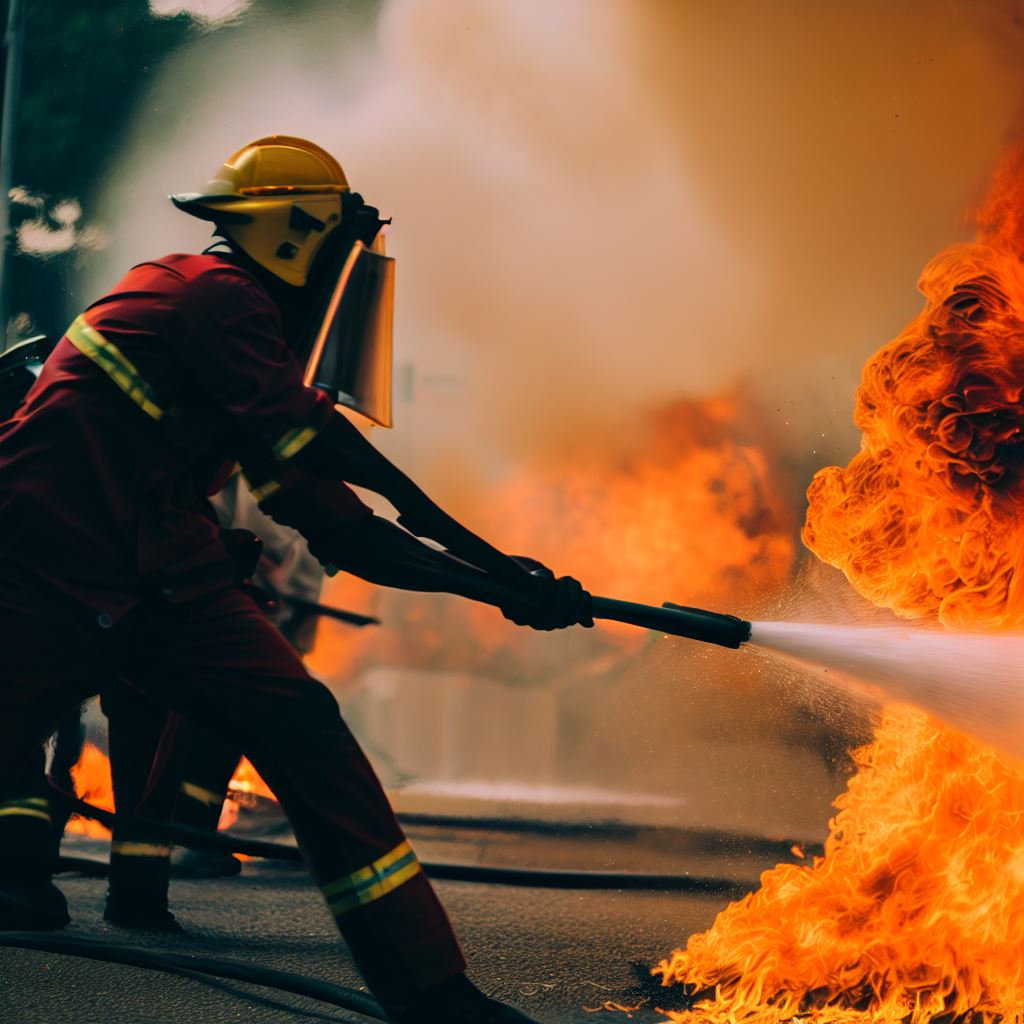
Rescuing and Assisting Victims
When disaster strikes and lives are in danger, Nigeria’s heroes step up to the challenge with unwavering determination and selflessness.
In the previous sections, we explored the preparation and firefighting aspects of these brave men and women.
Now, let’s dive into the crucial role they play in rescuing and assisting victims.
A. Conducting search and rescue operations
As part of their duty to save lives, firefighters conduct search and rescue operations in the midst of dangerous and chaotic situations.
Their training and commitment enable them to carry out these missions effectively.
1. Entering affected buildings or premises
Without hesitation, firefighters enter buildings or premises engulfed in flames or other hazardous conditions.
Guided by their extensive knowledge of building layouts and potential risks, they navigate through the darkness, smoke, and debris.
2. Locating and rescuing trapped or injured individuals
Each life is precious, and firefighters understand that every second counts.
Equipped with specialized tools and protective gear, they tirelessly search for survivors, listening for cries of help and following any signs of life.
With exceptional bravery, they pull people out of danger, providing them a second chance at life.
B. Providing medical assistance and support
Firefighters are not just trained in firefighting techniques; they are also skilled in providing medical aid to those in need.
They bridge the gap between initial response and the arrival of medical professionals, ensuring victims receive immediate care.
1. Administering first aid and basic life support
Armed with knowledge of first aid techniques, firefighters offer crucial assistance to injured individuals.
They stabilize patients, control bleeding, and alleviate pain while waiting for additional medical resources to arrive.
Their quick actions often make a significant difference in saving lives.
2. Coordinating with medical personnel for further treatment
Firefighters understand the importance of teamwork and collaboration.
They coordinate with EMS professionals, providing critical information about the victims’ conditions, injuries, and any other pertinent details.
This collaborative effort ensures a seamless transition of care, increasing the chances of a successful recovery.
In every rescue operation, Nigeria’s firefighters demonstrate their unwavering dedication and heroism.
Their ability to navigate dangerous environments, locate survivors, and provide medical aid has saved countless lives.
These unsung heroes truly embody the spirit of selflessness and bravery, making Nigeria a safer place for all.
Read: Sustainability: Eco-Friendly Coating Practices in Nigeria
Collaborating with Other Agencies
Collaboration is key in the fire fighting efforts in Nigeria.
Firefighters work hand in hand with various agencies to ensure public safety and effectively respond to emergencies.
A. Cooperating with police and security forces
Cooperating with police and security forces is an essential aspect of their work.
During emergencies, the primary goal of our heroes is to ensure the safety of the public.
They collaborate with police and security forces to establish order and manage the situation effectively.
By working together, they can efficiently handle challenging scenarios and provide the necessary support to those in need.
- Firefighters take charge of maintaining public safety during emergencies. They meticulously handle hazardous situations, preserving the well-being of individuals and protecting property.
Their active involvement in managing chaotic situations helps minimize injuries and potential threats to the community. - Additionally, they assist law enforcement in investigations if the need arises. Firefighters possess valuable expertise in assessing fire scenes and determining the cause of the incident.
By cooperating with the police, they ensure a comprehensive investigation is conducted, and all aspects of the incident are thoroughly examined. This collaboration contributes to finding the truth and holding accountable those responsible for any fire-related crimes.
B. Communicating with relevant government departments
Communication with relevant government departments is another crucial aspect of the firefighters’ work.
This cooperation enables efficient flow of information and fosters support for the improvement of fire fighting capabilities.
- Firefighters provide incident reports and regular updates to government departments. These reports summarize the nature of incidents, the actions taken by the fire department, and the outcomes of their interventions.
Timely and accurate information is crucial for government officials to assess the situation, allocate resources effectively, and make informed decisions. - Seeking support and resources from relevant government departments is vital for continuous improvement in fire fighting. Firefighters actively communicate their needs and requirements to these departments.
This collaboration ensures that necessary resources such as equipment, training, and funding are provided, enabling fire departments to enhance their capabilities and better serve the community.
Collaboration and effective communication with other agencies play a significant role in strengthening Nigeria’s fire fighting system.
By working together, firefighters, police, security forces, and government departments create a strong network of support and resources.
This collaboration reinforces public safety, aids investigations, and improves overall fire response and prevention strategies.
Together, they form a united front in the face of fire-related challenges, embracing the heroism required to protect lives and property in Nigeria.
Read: Workshops & Events: Coating Tech Education in Nigeria
Reflecting and Debriefing
A. Evaluating the firefighting operation
- Reviewing successes and areas of improvement: After every firefighting mission, it is crucial to evaluate what went well and what can be improved upon.
- Identifying lessons learned for future incidents: By analyzing past experiences, firefighters can gain valuable insights to enhance their response to future emergencies.
B. Psychological support and debriefing
- Addressing the emotional impact of challenging situations: Firefighters often face traumatic experiences that can have a significant emotional toll. Providing a safe space for them to express their feelings is essential.
- Promoting mental well-being among firefighters: Regular debriefing sessions can help identify signs of stress or burnout and provide necessary support to maintain firefighters’ mental health.
Reflecting on Nigeria’s firefighting operations is pivotal for continual improvement and firefighter well-being. This introspection involves evaluating both successes and areas for enhancement to bolster future responses.
During this assessment, Nigerian fire departments can pinpoint the factors contributing to their triumphs. This includes scrutinizing their strategies, equipment, and teamwork.
Simultaneously, acknowledging shortcomings fosters accountability and growth opportunities. Learning from past incidents is invaluable, enabling the implementation of necessary changes to enhance preparedness and response.
Yet, it’s not just operational aspects that demand attention. Providing psychological support and debriefing for Nigeria’s firefighters is equally critical.
Recognizing the emotional toll of their heroic endeavors is paramount. Establishing a supportive environment where they can freely express their emotions ensures their well-being.
Regular debriefing sessions should encompass mental health discussions. This holistic approach fortifies resilience and secures the long-term welfare of Nigeria’s firefighting heroes.
Conclusion
A. Recap of the heroic efforts of Nigerian fire fighters
Throughout the day, Nigerian fire fighters tirelessly risked their lives to save others and combat devastating fires.
B. Emphasizing the importance of their dedication and sacrifice
Their selfless dedication and unwavering commitment to protecting lives and property highlight the vital role they play in society.
C. Encouraging support for fire fighting services in Nigeria
It is crucial for communities and government to recognize and support the fire fighting services in Nigeria, ensuring they have the necessary resources and training to continue their life-saving work.

